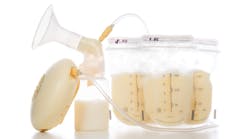Here's how you can prepare yourself and your workplace for the changes that come with having a nursing relationship with your child. Remember, you have several legal rights and accommodations.
Breastfeeding is “the normative standard for infant feeding and nutrition,” according to the American Academy of Pediatricians and “the best form of health care” by the late Brian Palmer, DDS. (1, 2) It is no surprise that dental hygienists—who are prevention specialists—would not only promote breastfeeding, but also frequently choose to breastfeed their own infants.
The production of human milk is a medical condition, but one with great benefits. Unfortunately, these benefits have little effect on tackling the challenges of expressing breast milk while working. There are emotional and physical challenges. In order to maintain an infant’s milk supply, plus avoid the complications and discomforts that come with delays in expressing milk, a nursing mom has to express breast milk three times during an eight hour work shift in a private space other than a restroom (it is a food source after all). Then you add in a hygiene schedule with patients lined up every 30–60 minutes, fatigue, getting used to a breast pump, and the innate desire to stay on schedule. Nursing is a challenge many working moms give up on—even RDH moms. (3)
This article is not meant to “shame” a mom who has decided not to breastfeed or has stopped breastfeeding her child. Breastfeeding is a multifaceted life-altering commitment. It is a personal choice and shouldn’t be taken away because of work. The purpose of this article is to empower the RDH who has decided to invest in this very complex, intricate system of nourishing her baby and claim her right for space and reserved breastfeeding time in the private practice setting.
So why do it?
The emotional, immunological, and physical benefits to mother, child, and wallet are well documented. Let’s review some underappreciated benefits related to dentistry.
The physiology of a mother’s breast and an infant’s mouth demonstrates one of the most profound systems of the human body (minus defects and other challenges). Breastfeeding for as long as a baby needs (there isn’t sufficient research to document when nursing should stop, but aiming for 12 months is gold) provides a foundation towards proper jaw and airway development. (2)
The immunological benefits are impressive. Science and nutrition journals all report the same: human milk is the downloaded version of mother’s immune system. The documented proof that breastfed babies are less sick, means the RDH mom will miss less time at work. (4)
A happy, healthy mom with happy, healthy baby is a happy, healthy employee.
And lastly, what about ethics? There are five principles to the ADA code of ethics: patient autonomy, nonmaleficence, beneficence, justice, and veracity. Why would justice or beneficence not be applicable when it comes to the welfare of an employee? Beneficence is “an action that is done for the benefits of others . . . to help prevent or remove harms or to simply improve the situation of others.” (5) Giving a nursing employee time and space to care for their body and the health and nutritionof their babies is a beneficent act that shouldn’t take threats or legal actions to accommodate. (5,6)
How to prepare for this journey
First, be aware that “all employers . . . regardless of the size of their business, are required to comply with” allowing necessary breaks to express milk. (7) “However, employers with fewer than 50 employees are not subject to the FLSA break time requirement if the employer can demonstrate that compliance with the provision would impose an undue hardship. Whether compliance would be an undue hardship is determined by looking at the difficulty or expense of compliance for a specific employer in comparison to the size, financial resources, nature, or structure of the employer’s business.” (7) In other words, a business with fewer than 50 employees would have to go through a process similar to a tax audit to be deemed exempt due to “hardship”. Wouldn’t it be easier to allow a hygienist to pump when needed? (7, 8, 9)
So assuming that no dentist or corporation would willingly subject themselves to an audit, and that they stand by the ADA code of ethics, there are ways to prepare for this special phase of motherhood:
- Discuss your intention to breastfeed with your employer while pregnant.
- Make blocks in the schedule for pumping ahead of time (around the second trimester).
- Keep in mind lactation is a medical condition—not a trend or lifestyle choice. Your body and baby deserve quality time that allows for less stress and anxiety, first time mothers may need more time to pump.
- Your pumping schedule will be no one's priority except yours. A gentle reminder of pumping times at the morning huddle helps to remind your workmates of your priorities.
- Recruit a supportive workmate, even if it means they simply grab your instruments or seat your next patient.
- If you are having a hard time getting in enough pumping sessions, adding a short pumping session (increasing frequency even if milk is not removed thoroughly) is better than nothing. (10)
- Put your mind in “zen mode” no matter what. There will always be patients waiting and rooms needing to be set up.
- Remember: the high volume demand of nursing doesn’t last forever. It is a phase. The first day of kindergarten will erase all memories of the late lunches and stress about pumping.
Editor's note: This article first appeared in RDH eVillage. Click here to subscribe.
For the most current dental headlines, click here.
References
1. The American Academy of Pediatrics. Breastfeeding and the use of human milk (policy statement). Pediatrics. 2012;129(3):e827-41. doi: 10.1542/peds.2011-3552.
2. Palmer B. The Importance of Breastfeeding as it Relates to Total Health. Brian Palmer DDS website. http://www.brianpalmerdds.com/bfing_import.htm. Accessed February 2, 2017.
3. Berger M. Women find breastfeed at work challenging, even in supportive settings. PennCurrent website. https://penncurrent.upenn.edu/features/women-find-breastfeeding-at-work-challenging-even-in-supportive-settings. Published October 13, 2016. Accessed February 2, 2017.
4. Palmeira P, Carneiro-Sampaio M. Immunology of breast milk. Rev Assoc Med Bras. 2016;62(2):584-593. doi: 10.1590/1806-9282.62.06.584.
5. ADA Principles of Ethics and Code of Professional Conduct. ADA website. http://www.ada.org/en/about-the-ada/principles-of-ethics-code-of-professional-conduct. Accessed February 2, 2017.
6. Beneficence vs. Nonmaleficence. UCSF School of Medicine website. http://missinglink.ucsf.edu/lm/ethics/Content%20Pages/fast_fact_bene_nonmal.htm. Accessed February 2, 2017.
7. Frequently Asked Questions – Break Time for Nursing Mothers. United States Department of Labor website. https://www.dol.gov/whd/nursingmothers/faqBTNM.htm#Q5. Accessed February 2, 2017.
8. Boehm T. Fair Labor Standards Act continues to present challenges for dental offices. DentistryIQ website. http://www.dentistryiq.com/articles/2013/08/flsa-continues-to-present-challenges-for-dental-offices.html. Accessed February 2, 2017.
9. Wages and Hours Worked: Minimum Wage and Overtime Pay. United States Department of Labor website. https://www.dol.gov/compliance/guide/minwage.htm. Accessed February 2, 2017.
10. Bonyata K. Establishing and maintaining milk supple when baby is not breastfeeding. KellyMom website. http://kellymom.com/ages/newborn/nb-challenges/maintainsupply-pump/. Updated December 18, 2016. Accessed February 2, 2017.
Christie Lincoln, RDH, is a practicing clinical hygienist, mother of three, and cohost of the MOMgienists podcast. She also uses her website yoursmilinghygienist.com to inspire the public to seek and engage the fullest potential of a hygienist, in an effort to uplift and highlight the integral role of this unique, often underestimated, health-care provider. Christie is also a member of the American Dental Hygienist Association and enjoys volunteering.







